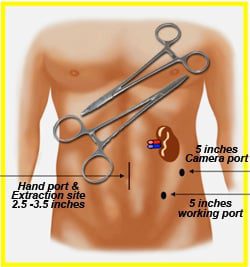
Surgical clips have been linked to kidney donor deaths. The clips are considered safe for a variety of surgeries, but are not recommended in laparoscopic kidney donor surgeries. In one case highlighted by CNN, mother of four, Florinda Gotcha, 41, died suddenly from a massive bleed after she donated her kidney to her brother Manuel […]
 Surgical clips have been linked to kidney donor deaths. The clips are considered safe for a variety of surgeries, but are not recommended in laparoscopic kidney donor surgeries.
Surgical clips have been linked to kidney donor deaths. The clips are considered safe for a variety of surgeries, but are not recommended in laparoscopic kidney donor surgeries.
In one case highlighted by CNN, mother of four, Florinda Gotcha, 41, died suddenly from a massive bleed after she donated her kidney to her brother Manuel Reyna. The family was not concerned about surgical risks since, kidney donor surgery is considered quite safe. In fact, said CNN, in the year prior to Gotcher’s surgery—2010—of the 6,276 people who donated a kidney, none died in the first 30 days following surgery. Gotcher’s surgery did go well; however, within 30 minutes while in the recovery room, she was showing signs of distress.
“She just took a deep breath and her eyes got real huge and then she fell back down and started breathing really, really bad,” Gotcher’s daughter, Melinda Williams told CNN. Gotcher’s surgeons at University Medical Center in Lubbock, Texas, rushed her back into the operating room and opened her up. They discovered a pool of blood in her abdomen in which the surgical clips were floating. Gotcher died from a massive, sudden bleed. Williams told CNN, that she learned about other, similar deaths.
When a donor kidney is removed, the renal artery is cut and closed. There are a variety of ways in which to close the renal artery—in fact, many surgeons use staples—but, clips are not considered safe in laparoscopic kidney donor procedures. In this procedure, surgeons remove all but a small stump of the artery, which is too small for the clips, which can slide off and lead to sudden and fatal bleeds, CNN explained. Gotcher’s death was not an isolated incident. Four other donors, worldwide, died in surgeries in which the clips were used between 2001 and 2008; 12 other patients have suffered injuries, said CNN.
In 2004, transplant surgeons started raising concerns about the use of these clips in kidney donors, sending letters to the U.S. Food & Drug Administration (FDA), publishing articles in medical journals, and presenting information at transplant conferences. Surgeons are calling for a warning on the clips, not just on the clip packaging, which is usually not kept in operating rooms
Clip maker, Telefex, began sending letters in 2006 to hospitals warning that the devices are “contraindicated” in laparoscopic kidney donor surgeries. CNN pointed out that hospitals have received between three and six such letters and, although officials at University Medical Center received the letters in 2006, they were not purchasing the clips at that time. When they purchased the clips years later, the letter was forgotten among the many letters it receives annually about devices and safety issues. The hospital admitted its system to track warnings was insufficient and has since put in place corrective measures.
At least one surgeon noted that the letters were not strong enough and don’t mention the risk of death and that donors have died when the clips are used. The FDA disagreed, saying the letters were “effective” and “adequate to prevent a reoccurrence of the problem” despite that only half of the hospitals acknowledged receiving the letters, according to a 2007 FDA audit, said CNN.
The FDA issued a safety notification after Gotcher’s death reminding surgeons that the clips are contraindicated for kidney donor surgeries, saying that it and the Health Resources and Services Administration (HRSA) alerted health care providers about the Weck Hem-o-Lok Ligating Clips. The notice stated that the clips are contraindicated for the renal artery during laparoscopic donor surgeries and stressed that complications have occurred within hours of surgery. The agencies stated that 15 medical device reports of 12 injuries and three deaths from 2001 and 2005 were received; every report was linked with the use of the clips during kidney donor surgeries. Three more kidney donor deaths occurred since the 2006 contraindication notice, all linked to the contraindicated use.
In a statement to CNN, the FDA said that when used correctly the clips can effectively control bleeding, adding that “despite repeated efforts to communicate this important safety information, some transplant surgeons continue to improperly use these clips. While the FDA can warn against the unsafe use of a medical device, doctors are not prohibited from using cleared or approved devices for an unapproved use within their practice of medicine.”


